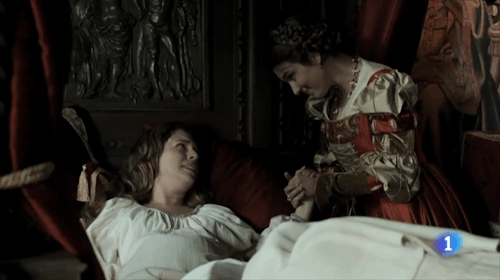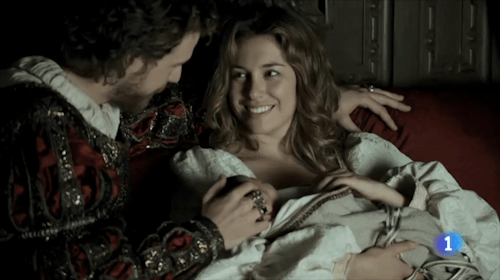#philip ii
→21May1527: the birth of Philip II of Spain
To historians he is an enigma: he receives us as he did his ambassadors, with the utmost cortesy, listening to us, replying in a low and often unintelligible voice. Never speaking of himself at all. For three whole days just before he died, he confessed the errors of his lifetime. But who could truly imagine these errors, numbered before the tribunal of a conscience whose judgements may or may not have been just, as it searched the recesses of a long life? Here lies one of the great mysteries of his life, the shadow which if we are truthful we must leave across his portrait. Or rather his many portraits. What man does not change in the course of his life? And Philip’s life was a long and disturbed one, from the painting by Titian of the prince in his twentieth year to the terrible and moving portrait by Pantoja de la Cruz which show us the king at the end of his reign, the shadow of what he once had been. — Fernand Braudel, The Mediterranean and the Mediterranean world in the age of Philip II
Post link
21 May 1527 - The Birth of Philip II of Spain
“As is often the case with a first child, the empress was in labour for many hours. She asked for a veil to be placed over her face, so that no one would see her agony; and when a midwife urged her to give full vent to her feelings the empress replied sternly: ‘I would rather die. Don’t talk to me like that: I may die, but I will not cry out.’ Philip entered the world around 4 p.m. on 21 May 1527. Many Spaniards had expected the prince to receive one of the traditional names of the peninsular dynasties, such as Fernando or Juan, but Charles insisted on calling his firstborn after his own father, and so at the baptism ceremony two weeks later the royal heralds shouted three times: ‘Philip, by the grace of God prince of Spain!’”
Geoffrey Parker, Imprudent King: A New Life of Philip II
El Rey.
Amados y fieles nuestros: A Nuestro Señor ha placido alumbrar a la serenísima Emperatriz, nuestra muy cara y amada muger, con un hijo, que parió a los XXI del presente. La qual, aunque ha pasado harto trabajo, queda ya, loores a Dios, muy buena. Plegará a la divina bondad que deste fructo que ha sido servido de darnos, succederá mucho servicio suyo, establecimiento de beneficio público y reposo de nuestros Reinos y señoríos.
Avisámosvos dello por vuestro contentanmiento y para que deis gracias a Dios por tanto beneficio.
Data en Valladolid a XXIII de Mayo de MDXXVII.
Yo, el Rey.
Philip’s birth announcement by Charles V, 23 May 1527. In Felipe II y su tiempo by Manuel Fernández Álvarez
Post link
Aww, Philip defended his sister Juana against the acusations their father levelled at her.
What were the accusations exactly?
It was in 1554 when Philip was preparing to depart for England and leave Juana governing Spain. Charles was against her candidature as a regent, he thought that she was more ‘haughty’ than Maria and was dissatisfied with her conduct at the court of Portugal. He accused her of leading disorderly life, particularly of spending too much money in maintaining her household. So Philip defended Juana and refuted his accusations writing to him and saying that he had got wrong information about Juana, that her household didn’t amount to 40.000 ducats in year as he was told etc.
Aww, Philip defended his sister Juana against the acusations their father levelled at her.
“Both had long resisted the clamour for war from strident voices at home. Both recognized that their countries had by long tradition been allies and that wars between them were the exception rather than the rule. (..) The two monarchs were united, too, by their innate conservatism. Both dreaded war for its expense and for its uncertainty.”
Patrick Williams, Armada
“Philip knew how to distinguish his political from his religious objectives. In this sense he and Elizabeth were kindred spirits.”
Patrick Williams, PhilipII
“… Elizabeth of England (whose mind, apart from being quicker, seems much like Philip’s)…”
Peter Pierson, Philip II of Spain
“… [Elizabeth] tended to seek the opinion of each councillor individually and then to “leak” it to the rest – a practice surprisingly similar to Philip II’s style of government.”
Colin Martin and Geoffrey Parker, The Spanish Armada
“His [Philip’s] slowness in making decisions was, with reason, strongly criticised by those who worked with him. (..) His caution and slowness were, clearly, dictated by the circumstances in which he had to rule. Elizabeth of England was also criticised for the same reasons.”
Henry Kamen, Philip of Spain
“… ambos eran humanistas.” - “… both were humanists.”
José Martínez Millán, VidasCruzadas:FelipeII-IsabelIdeInglaterra
https://youtu.be/SIfR0QxHRZY?t=257
“When the familiar liturgy began, she listened to it prostrate on cushions set out for her in the Privy Chamber, ‘hard by the closet door’. This was eerily like her old adversary Philip II, who, when dying, had listened to the chanting of the monks and priests at the altar in the monastic church at the Escorial through an interior window in his bedchamber.”
John Guy, Elizabeth: The Forgotten Years
“… tenemos que aceptar que Felipe II se sentía responsable no sólo de su alma, sino de la de todos sus súbditos, y sin tener esto en cuenta nunca llegaremos a comprenderle, por muchos detalles que tengamos de sus ataques de gota. Si no hubiera creído que al fin de su vida mortal le esperaban Dios y san Pedro para tomarle cuenta bien detallada de sus dichos y hechos, no habría sufrido como sufrió. Intentó mantener a la vez su honor y su integridad, pero a veces tuvo que sacrificar la moralidad por la reputación y la seguridad de sus estados y lo hizo consciente de la carga que conllevaba tal decisión. Con su aguda consciencia, él era el primero en admitir que había cometido errores y que merecía el debido castigo por ello; por eso se esforzó toda su vida en obtener el favor de Dios y de su Iglesia.”
“… we have to accept that Philip II felt responsible not only for his soul, but for that of all his subjects, and without taking this into account we will never understand him, no matter how many details we have about his gout attacks. If he had not believed that at the end of his mortal life God and Saint Peter were waiting for him to take a very detailed account of his words and deeds, he would not have suffered as he suffered. He tried to maintain both his honor and his integrity, but at times he had to sacrifice morality for his reputation and state security and he did it being aware of the burden such a decision entailed. With his keen awareness, he was the first to admit that he had made mistakes and that he deserved due punishment for it; that is why he strove all his life to obtain the favor of God and his Church.”
María José Rodriguez-Salgado
https://www.revistadelibros.com/biografia-de-felipe-ii-por-henry-kamen-felipe-de-espana/
I pretty much agree with this estimation. And his keen awareness is one of the things that draw me to him.
These are all sufficient reasons why the long agony which ended in September, 1598 was not a great event in Mediterranean history; good reasons for us to reflect once more on the distance separating biographical history from the history of structures, and even more from the history of geographical areas.
– Braudel, The Mediterranean and the Mediterranean World in the age of Philip II
writing a dramatic performance about the tomb of Philip II called The Vergina Monologues
“I hope that God will restore his health – unless the fact that I hope for it will harm him.”—
Philip II of Spain, referring to the illness of the brother of the count of Feria. November, 1558. Quoted in Imprudent King: A New Life of Philip II by Geoffrey Parker.
One of my favourite Philip’s quotes ever.
“She [Elizabeth I] later claimed to have learnt Spanish in order to converse with Philip.”—
Rodríguez-Salgado, M., & Adams, S. (1984). IV The Count of Feria’s Dispatch to Philip II of 14 November 1558. Camden Fourth Series,29, 302-344. Note 9 to the text.
!!!
They cite The City of London in International Politics at the Accession of Elizabeth Tudor (Manchester, 1975) by Ramsey, G. D. who in turn cites Verbal de la dernière eue audience par le sieur de Zweveghem de la royne d’Angleterre, en Hamptoncourt, le premier jour de novembre 1574inCorrespondance de Philippe II by Gachard L. P. (ed.), vol 3.
!!!
Returning to this post for I have new exciting information to add. As can be seen above, the claims of Elizabeth having learnt Spanish to communicate with Philip II originates from the source written in French. It is the record of Zweveghem’s audience to Elizabeth on 1 November, 1574.
Recently I learnt that there has been made the English translation of the part where Elizabeth speaks about her Spanish and Philip II. Its author is @genretuvoiswho not only shared her work (the modernized French version and the translation itself) with me but also most kindly allowed me to post it on my blog. As the author of the translation informed me, Zweveghem was delivering the letter to Elizabeth from the Grand Commander of Castile Luis de Requesens (who also served as the Governor of the Netherlands at the time) representing Philip II. The letter was written in Spanish. The Spanish merchant Antonio de Guaras, who in the absence of a Spanish ambassador in London was notifying Philip’s government about the situation there, mentioned the audience in his 7 November report: “As M. de Zweveghem will report, he was well received at Court with the King’s letter.” For further context: on 21 August 1574 building on the agreement reached in the previous year the Treaty of Bristol was concluded between England and Spain renewing trade between the two countries that had been ceased since 1569, and both sovereigns managed to secure their fragile relationship for some time.
The modernized French text and translation
“Elle […] confessa librement de le [le castillan] savoir et de l’avoir appris à si bonne occasion qu’elle espérait ne l’oublier jamais, à savoir pour pouvoir être entendue de Sa Majesté, lorsqu’elle était sa prisonnière, combien qu’elle ne lui parla alors que comme le perroquet, selon qui lui était commandé ; souhaitant avec affectioné regret et exclamation sa venue aux Pays-Bas, pour avoir occasion d’aller l’attendre et le recevoir en ses ports, et lui dire sa gorgée avec plus de liberté qu’elle ne pouvait alors, et déclarer l’obligation qu’elle lui tient, et l’entier amour qu’elle lui porte, et assurer tellement la confiance que S.M devait prendre d’elle, que les mauvaises langues ne seraient plus écoutées, que c’était un grand déplaisir aux princes de ne se pouvoir entretenir et sans personnes interposites, déclarer l’un à l’autre le fond de leurs pensées, que, si cela était donné, serait tant empêché à remouvoir les suspicions lesquelles s’engendrent souvent sans cause par de mauvais ministres »
“She confessed freely that she knew it [Castilian] and that she learned it for a very good reason she hoped never to forget, that is to be understood by His Majesty, for when she was his prisoner, she talked to him like a parrot and how she was commanded to. She wished with affectionate regret and force that he came to the Netherlands, to have the opportunity to wait for him and receive him in her ports, and tell him what she truly has in her heart with more freedom than before, and to declare her commitment to him, and the full love she bears him, and to assure him that he can trust her, that the malicious gossips won’t be heard anymore ; that it was a great displeasure that princes cannot confer with each other and without intermediaries, declare to one another the true meaning of their thoughts ; that, if it was possible, would prevent the suspicions which are caused often without reason by bad ministers.”
Apart from revealing her motivation to learn Spanish, Elizabeth once again makes clear that she had met Philip and, as she had done before, expresses her wish to see him again. But what I find particularly interesting about it is the line “when she was his prisoner, she talked to him like a parrot and how she was commanded to”. This is the only reference I have seen thus far where Elizabeth not only refers to their meeting but also alludes to how their meeting might have gone!
Tagging people who, I think, might be particularly interested in this @brontefan135@history-be-written@tulipanblanco@olishkawinter@inkteller@mygoodqueenbess















